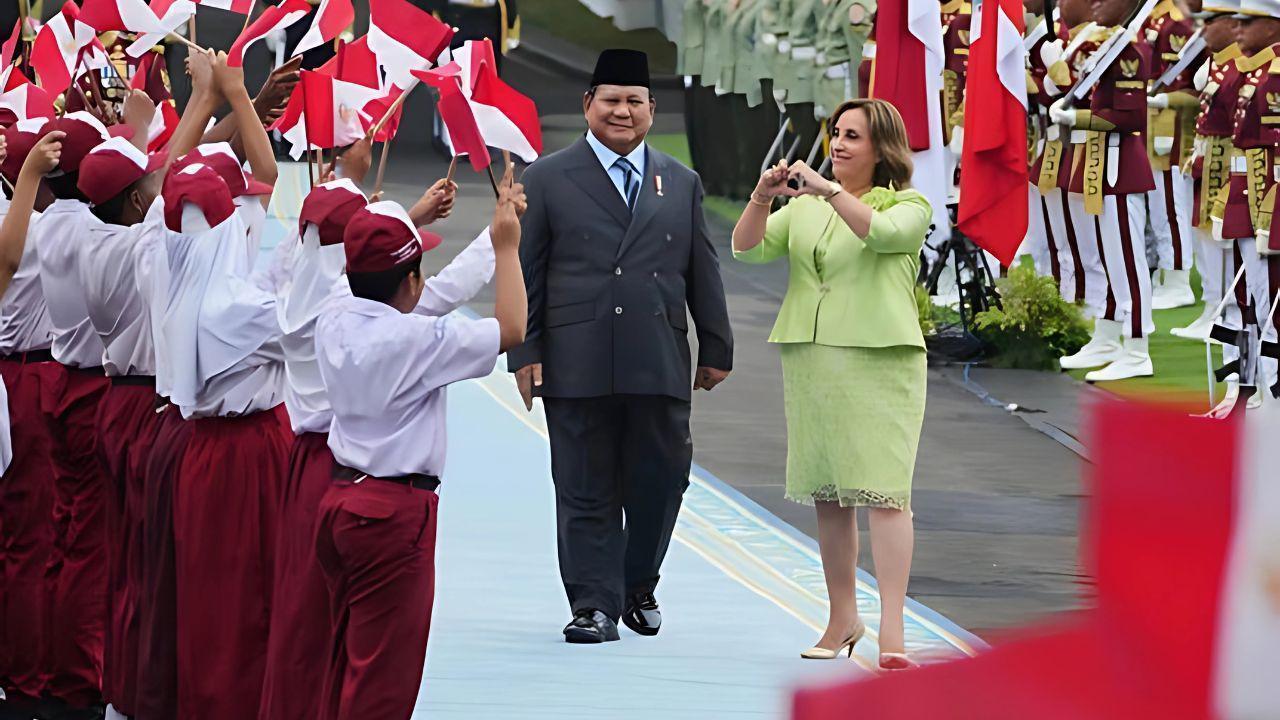
Post by : Priya
Photo:AP
Indonesia and Peru formalized a Comprehensive Economic Partnership Agreement (CEPA) in Jakarta, a landmark trade deal aimed at broadening market access, fostering sustainable growth, and building multifaceted cooperation between these two geographically distant yet economically complementary nations.
The signing ceremony was a high-profile event where Indonesian President Prabowo Subianto and Peruvian President Dina Boluarte underscored the historic nature of this agreement, marking an important chapter in their countries’ bilateral relations that have formal diplomatic roots dating back 50 years to 1975. This was President Boluarte’s first visit to Indonesia, reciprocating President Prabowo’s attendance at the APEC summit in Lima the previous year, thus reinforcing political goodwill alongside economic objectives.
Background and Strategic Context
Global trade patterns in recent years have been increasingly shaped by geopolitical shifts and new trade barriers, especially U.S. protectionist policies that impose tariffs on several Indonesian exports. For example, a U.S.-Indonesia trade framework agreement established in July 2025 includes a 19% reciprocal tariff on key Indonesian exports such as vehicles and biodiesel, challenging Indonesia’s competitiveness in its largest market.
Against this backdrop, the Indonesia-Peru CEPA represents a strategic diversification of Indonesia’s export destinations. Peru, with a growing middle-class population of approximately 34 million people and its expanding demand for renewable energy, vehicles, and agricultural products, offers a promising alternative market. This agreement thus acts as a counterweight to trade headwinds in the U.S. and European Union, helping Indonesia reduce dependence on these regions, which collectively account for over 40% of its exports.
Trade Figures and Economic Opportunities
In 2024, bilateral trade between Indonesia and Peru reached about $480 million, with Indonesia exporting goods valued at roughly $330 million and importing approximately $150 million worth of products from Peru. Indonesia’s main exports to Peru include automobiles, automotive parts, biodiesel, and footwear, while Peru primarily exports cocoa beans, grapes, and other fresh fruits like blueberries to Indonesia.
The CEPA is expected to:
Eliminate or reduce tariffs on a wide range of goods, notably vehicles, footwear, biodiesel, coffee, and palm oil, enhancing their price competitiveness.
Streamline customs processes and logistics, including digital documentation and real-time cargo tracking, which will reduce delivery times by up to 20%, especially benefiting perishable goods.
These provisions will accelerate transport and reduce costs, paving the way for increased trade volumes and new business collaborations. Improved infrastructure cooperation between Indonesian and Peruvian logistics providers will also support cold chain development, benefiting the storage and distribution of temperature-sensitive products such as fruits and coffee.
Sectoral Highlights: Vehicles, Biodiesel, and Agriculture
Several key sectors stand to gain from the agreement:
Automotive: Indonesian car manufacturers, including major firms like PT Astra International and PT Toyota Astra Motor, will benefit from Peru’s acceptance of vehicles that comply with U.S. safety standards without additional modifications. This simplification stands to boost Indonesian vehicle exports to Peru by around 30% within a few years.
Biodiesel: With Peru’s increasing emphasis on renewable energy sources, Indonesian palm oil-based biodiesel (B40-B50 blends) is well-positioned for market expansion. The CEPA also ensures environmental standards align with global sustainability norms, addressing concerns such as deforestation which affect access to European markets.
Agricultural and Agri-industrial goods: Indonesia’s exports of cocoa, coffee, palm oil, and processed agricultural products will complement Peru’s exports of raw materials, creating opportunities for value-added trade. Peru also gained new market access for its fresh fruits, including blueberries, quinoa, grapes, and hopes to include pomegranates soon.
Broader Cooperation Beyond Trade
In addition to economic and trade matters, the Indonesia-Peru partnership sets a framework for cooperation in areas critical to both countries’ development and security:
Collaborative efforts to combat narcotics trafficking and illegal trade.
Partnerships in food security, mining, energy transition, fisheries, and defense sectors.
Support for Peru’s aspirations to deepen ties with the Association of Southeast Asian Nations (ASEAN), reflecting Indonesia’s role as a regional leader.
These multidimensional collaborations demonstrate the two governments’ intent to build trust and shared prosperity beyond pure economic interests.
Geopolitical and Global Trade Implications
The CEPA comes at a time when global trade is influenced by protectionist trends, rapid geopolitical realignments, and a growing importance of South-South cooperation. Diversifying export markets into Latin America via Peru helps Indonesia hedge against uncertainties and opens pathways for Asian goods in an underexploited market.
By positioning itself as a hub for Asian exports to South America, Indonesia enhances its role in global supply chains, mitigating risks from tariffs imposed by larger economies such as the U.S. and regulations from entities like the European Union.
Investment Prospects and Future Outlook
This agreement sends positive signals to investors regarding infrastructure development and logistics projects in both countries. Indonesian investors, invited by President Boluarte, have opportunities to participate in such projects in Peru, further integrating the two economies beyond trade.
The CEPA's modern customs facilitation, streamlined regulations, and sector-specific advantages create an attractive environment for businesses, investors, and policymakers seeking sustainable growth partnerships.
Indonesia Peru CEPA










Qatar slams Netanyahu’s threats over Hamas office in Doha
Qatar strongly rejects as “reckless” Netanyahu’s demand to expel Hamas officials, calling his claims

Qatar bombing causes friction in Trump-Netanyahu alliance over strike in Doha
The Doha bombing tested the bond between Trump and Netanyahu, raising questions over peace efforts a

Israel warns it will kill Hamas leaders next time if they escaped in Doha airstrike
Israel warns it will kill Hamas leaders if they escaped the Doha strike, raising tensions with Qatar

Alibaba Cloud Leads China’s AI Market with 36% Share
Alibaba Cloud captured over one-third of China’s AI cloud market beating rivals and investing billio

Cambodia Defends China’s Belt and Road as Economic Lifeline
Cambodia praises China’s Belt and Road projects, calling them vital for growth rejecting claims of d

Portugal Norway England shine in UEFA World Cup qualifiers
Portugal beats Hungary 3-2 Ronaldo scores Haaland shines for Norway, Kane leads England in dominant